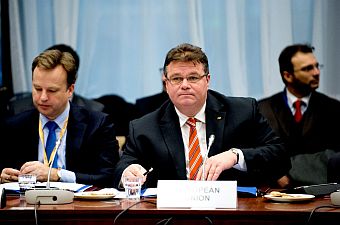Economics, Energy, EU – Baltic States, Legislation, Lithuania, Markets and Companies
International Internet Magazine. Baltic States news & analytics
Sunday, 25.01.2026, 10:18
Linkevicius: EU has to address together the economic and social disparities
 Print version
Print version |
|---|
| Photo: urm.lt |
“There is still an important need to reduce
disparities in the European Economic Area. The economic crisis has even
increased them, especially if we look at youth unemployment. Financial
Mechanisms of the EEA and Norway are very valuable in reducing disparities. We
should start negotiations as soon as possible on their renewal as the current
Financial Mechanisms expire on April 30, 2014,” said Minister Linkevicius.
Minister Linkevicius also encouraged all sides to conclude negotiations on
Croatia’s accession to the EEA in the nearest future in order for Croatia to
use the benefits of the EEA Agreement as well as of the Financial Mechanisms.
Minister welcomed news that Norway and Iceland will take further steps in
adoption of the EU legislation on postal services and Norway will also move
forward on legislation on pediatric products as well as reconsider customs
duties on meat and cheese.
The EEA Council welcomed the constructive relationship between the EU and the
EEA EFTA countries in the area of climate change and discussed the challenges
and next steps for a 2030 Framework for Climate and Energy Policies.
“The role of the European Free Trade Association countries–members of the
European Economic Area in shaping the energy future is very important, considering
your energy resources, your high percentages of renewable energy use, and your
industrial and research know-how in various energy matters. Your assets and
capabilities are of interest not only to the EU, but also on a global level:
and your policy choices should help shape the debate at the global level,” said
Minister Linkevicius.
Before the meeting of the EEA Council, the Ministers within the framework of
the political dialogue had a debate on Eastern Partnership and the situation in
Egypt and Syria.
The EEA Agreement came into force January 1, 1994. The EEA Council meets twice
a year and provides political impetus for the development of the EEA Agreement.
The Presidency of the EEA Council alternates each term between the EU and the
EEA EFTA side. Iceland has the Presidency this term.








 «The Baltic Course» Is Sold and Stays in Business!
«The Baltic Course» Is Sold and Stays in Business!

